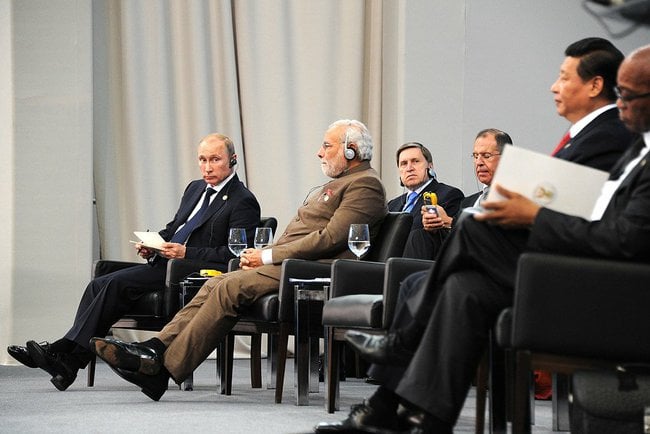
Putin at a BRICS summit in 2014. Photo Credit: Presidential Press and Information Office
Is Russia’s aggressive foreign policy finally catching up to it?
A recent poll of 26 countries, which was conducted by the Pew Research Center, found that views of Russia and its president, Vladimir Putin, are largely unfavorable, and in some countries, still on the decline.
Anti-Russian sentiment was highest in Jordan and Poland, where 80 percent of participants expressed a negative view toward the country. Some notable runner-ups included Israel (74 percent), Japan (73 percent) and Ukraine (72 percent). In Western Europe, Germany and France followed shortly behind, with 70 percent of participants expressing unfavorable opinions toward the country.
For the most part, public perception of Putin was lower in all of these countries, even if only marginally, than perception of Russia. Here, Spain took the lead, with 92 percent of participants expressing no confidence in Putin’s ability to do the right thing in world affairs. Poland (87 percent), France (85 percent) and Ukraine (84 percent) followed closely behind.
To some extent, these numbers are not tremendously surprising. Even before the conflict in Ukraine kicked off in early 2014, relations between Germany and Russia had begun to sour. In 2010, 50 percent of Germans expressed favorable views toward Russia; by 2014, that number had dropped to a staggering 19 percent. Meanwhile, in Russia, positive feelings toward Germany dropped from 78 percent in 2011 to 35 percent in 2015.
Distrust runs rampant — and for good reason. Eastern European and Baltic states, even those that are NATO members, view Russia’s invasion of Ukraine as a stepping stone. “Little green men,” the title given to the unmarked, unacknowledged forces that entered Ukraine in 2014, are just a hop, skip and a jump away. In preparation, Baltic and Eastern European states have girded themselves up in a defensive position. Some, like Poland, have witnessed a dramatic rise in membership to paramilitary associations. There’s even been a proposal to scoop up some of the members of these associations to establish a Territorial Defense Force, somewhat akin to the U.S. National Guard.
Of course, pissing off — or at the very least, freaking out — the EU is undoubtedly on Putin’s agenda. The question is how Russia’s relationship with those countries with a positive opinion, or even no opinion at all, will change in the years to come.
Pro-Russian sentiment was highest in Vietnam (75 percent), Ghana (56 percent) and China (51 percent). All three were mostly supportive of Putin’s conduct in world affairs as well. That makes sense: Russia’s own so-called pivot to Asia has emphasized both Vietnam and China.
Where things get murky for Russia is in Africa. Although Russian influence in Africa was extensive during the Cold War, it pulled back dramatically after the fall of the Soviet Union. Nevertheless, Russia continues to engage in arms and resources trade with a number of Africa nations, albeit under different ideological pretexts. This time it’s more about business, not exporting a revolution.
Although Russia has actively pushed for more economic engagement in both Africa and Asia, more trade doesn’t necessarily lead to an empathetic public. In South Africa, a member of the BRICS partnership, of which Russia is an integral part, only about 25 percent of people viewed Russia in a positive light. As a leader, Putin was viewed slightly more favorably — 28 percent were confident he would do the right thing in world affairs. Meanwhile, over half of South Africans held negative opinions of Russia.
But there were also a number of countries where participants claimed to have no opinion of Putin. In Ethiopia, for example, only 10 percent expressed an unfavorable view of Russia, but that’s because a little less than 50 percent of those polled expressed any opinion at all. So as Russia pushes to build its ties with Africa and Asia, a little charm offensive may be in order.